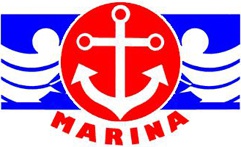Marina

|
Meeting the language and skills needs of coastal and river tourism workers |
Coastal and river tourism is a rapidly growing sector in Europe, the largest employer among all maritime activities, and makes a vital contribution to the economies of coastal communities, providing not only direct employment but also spin-off benefits. Foreign visitors constitute a significant proportion of coastal tourists. Because it is largely seasonal, however, many workers are low-skilled and much less likely to speak a foreign language than the better-educated permanent employees. Some seasonal employees are migrants and may not even speak the local language. Yet it is precisely the seasonal and lower-skilled employees who are most likely to have direct contacts with foreign visitors, in kiosks, information booths, ticket offices, petrol stations, repair bays, shops, restaurants, internet cafes etc – that is, in the reception of tourists. Thus they are often in need of skills training and language learning opportunities.
Language classes are mostly aimed at leisure learners whereas skill training takes place in the local language. The beauty of the Content and Language Integrated Learning (CLIL) method is that it combines both by teaching skills in a foreign language. It also quickly engenders confidence in the ability to learn. We aim, therefore, to develop CLIL courses in the reception of foreign tourists in marinas, yachting harbours and cruise liner ports, in languages chosen after a needs analysis. In order to make the courses widely usable by learners, employers and educational providers, the courses will be available through Open and Distance Learning (ODL), delivered through a dedicated learning management system.
The main tangible outcomes of Marina are a manual and handbook, innovative courses developed and a range of reports, all freely available via the internet. The main intangible outcomes are the sustainable work relationships formed between the partners and the strategic working groups in each partner country.
| EU-Program: | LLP, Leonardo da Vinci TOI |
| Coordination: | Godalen Videregaende Skole (Vocational College), Stavanger (NOR) |
| Contact: | Karin Kronika, Helmut Kronika |
| Duration: | December 2009 - November 2011 |
|
|
This project has been funded with support from the European Commission. This publication reflects the views only of the author, and the Commission cannot be held responsible for any use which may be made of the information contained therein. |